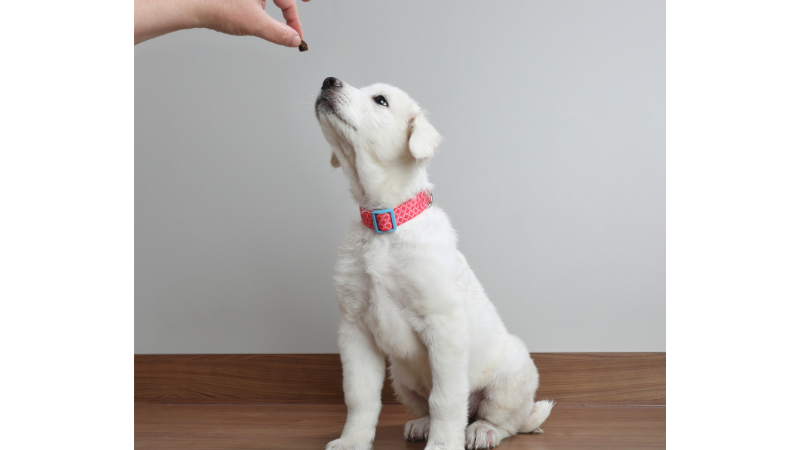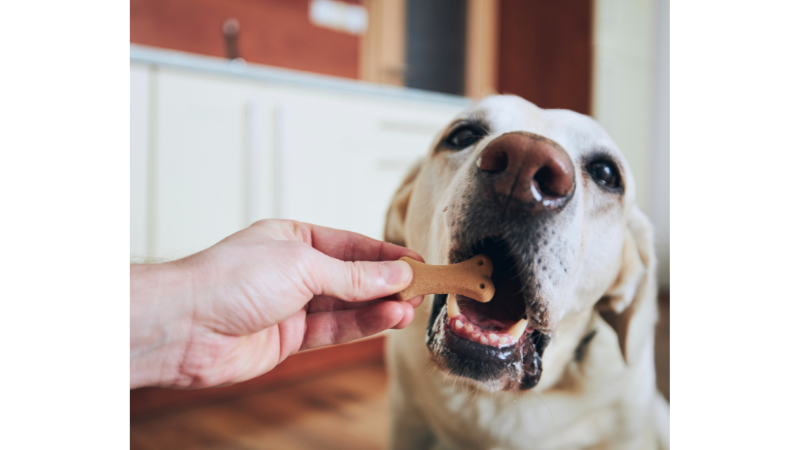Best Dog Treats For Sensitive Stomach (2024)
5 best dog treats for sensitive stomach
We have listed down 5 best dog treats for sensitive stomach in this article here, which will help you in making your decision of buying treats for dogs with sensitive stomach.
Dogs will do anything for a treat, and you’re usually eager to give it to them. Some dogs have sensitive stomachs, limiting the kind of goodies they may consume without developing an upset stomach.
If your dog has digestive problems, the first step is to figure out is what’s causing it. You may go over the top in buying dog treats for sensitive stomachs and pick the one that best suits your pup’s needs.
Before we list down the best dog treats for sensitive stomach, let’s speak about digestive difficulties in dogs and what to look for in terms of good and harmful substances.
Many factors might cause a sensitive stomach in dogs. Perhaps they’re eating something that doesn’t suit them or dealing with underlying health problems. It might be difficult to locate goodies that won’t make your dog ill if they have a sensitive stomach.
In this article, we’ll discuss how dogs acquire sensitive stomachs, talk about the sensitive stomach symptoms, how you may assist your dog in developing a healthy digestive system and best treats for dogs with sensitive stomach.
So, how do you know that your dog has a sensitive stomach?
There are a few indicators to find out if your dog has difficulties in digesting food or not. The following are some of the most prevalent signs of digestive problems in dogs:
1. Vomiting
If your dog vomits, it might be one of the main symptoms of having digestive problems. Vomiting can be caused by various factors, including eating something that doesn’t work with them, an illness, or an allergy to a certain dietary element.
2. Energy deficiency
If your dog is normally highly energetic but has immediately lost it, it might indicate that they are unwell with stomach problems. Dogs suffering from intestinal disorders typically lack the energy to play or run around as they normally do.
3. Diarrhea
Another typical indication of digestive problems in dogs is diarrhea. Diarrhea can develop when a dog’s intestines get inflamed or when an infection is present.
4. Breath problems
Dogs with poor breath may also suffer from stomach problems, though this is less common. Many factors can contribute to bad breath, including bacterial overgrowth in the intestines, liver illness, and renal failure.
5. Gas
Frequent gas is another indicator that your dog is having digestive problems. Common symptoms are a bloated stomach, profuse drooling, and whimpering or groaning while the dog tries to eat or drink.
6. Loss of weight
If your dog has lost weight unexpectedly, it might indicate that they are suffering from a sensitive stomach. Several factors might contribute to weight loss: poor digestion and a lack of appetite.
7. Appetite loss
If your dog isn’t eating as much as normal, it might indicate that they are experiencing digestive issues. Many factors might contribute to a loss of appetite, including a sensitive stomach.
8. Food in the stool that hasn’t been digested
You may observe undigested food in your dog’s feces if they have difficulty digesting their diet. This might indicate that they are having difficulty breaking down the meal effectively, causing them discomfort. A black or tarry stool is the most common appearance.
9. Grass eating
If your dog starts eating grass, it might be a symptom of having digestive problems. When dogs attempt to puke or have an upset stomach, they eat grass. Dogs may eat grass to try to settle an unsettled stomach.
If your dog is exhibiting any of these symptoms, you should take them to the veterinarian for a check-up. The veterinarian will be able to diagnose your dog’s problem and provide the right therapy.

5 Best Dog Treats For Sensitive Stomach
The following are our recommendation of 5 best dog treats for sensitive stomach:
1. Chewy Cloud Star Tricky Trainers
Cloud Star Tricky Trainers omit artificial colors and flavors for a limited-ingredient preparation. These soft, chewy, high-value snacks are good for dogs with sensitive stomachs that want more incentives to stay motivated to work with 3 kcals per treat.
They’re just right for your hungrier hound. It includes chicken liver, chickpea flour, maple syrup, natural smoke flavor, rosemary extract, and a few more delectable components.
Pros
✓ Cloud Star has never had a product recall to our knowledge.
✓ According to AAFCO guidelines, foods are nutritionally full and balanced.
✓ Affordable
Cons
✓ Plant-based protein is used in several recipes.
✓ Protein content is lower than typical.
2. Probiotic for Dogs Zesty Paws
With Zesty Paws Probiotic snacks for dogs, you can help your dog’s delicate stomach. These healthy soft chews are constructed with a pumpkin and papaya basis. They also include a lot of probiotics in them to keep your dog’s tummy happy.
According to Zesty Paws, these chews promote the gut microbiota for occasional gastrointestinal discomfort. Many pleased pet parents believe that these delightful snacks aid their pets.
Pros
✓ Improve the health of your intestines and the way your digestive system works.
✓ Constipation, diarrhoea, gas, and bloating can all be helped with probiotics.
✓ Skin and coats are healthier, and breathing is better.
Cons
✓ Taste may be inconsistent
✓ Slightly overpriced
3. Freeze-Dried Dog Treats from ORIJEN
With ORIJEN’s Freeze-Dried Dog recipe, you may give your dog an easy-to-eat treat. These healthy snacks are created using free-range chicken and turkey, and wild-caught monkfish.
These treats are also highly digestible for your sensitive dog due to the inclusion of organ meats. The limited-ingredient composition also makes things simpler for your dog to digest the treats, resulting in fewer diarrhea problems.
Pros
✓ Amino acids, enzymes, and minerals are preserved, which are extremely beneficial to your dog’s stomach and digestive system.
✓ Freeze-dried dog food is delicious to dogs.
✓ Dog food that has been freeze-dried is light, portable, and has a long shelf life.
✓ To keep your dog healthy, you’ll be able to quickly bring nutritious food with you.
Cons
✓ The bacteria in these uncooked foods might proliferate once they’ve been rehydrated.
✓ When rehydrated, the food may be powdered or crumbly and turn to mush, which some dogs may not like.
4. Soft & Chewy Milk-Bone Dog Treats
Milk-Bone Soft & Chewy Snacks are delicate chicken-based treats. These delicious nibbles are simple for your dog to eat because of their soft texture and bone form.
These treats also include 12 vitamins and minerals to help your dog’s body function at its best. This dish is also devoid of rawhide and peas, making it a suitable food for dogs allergic to these substances.
Pros
✓ Good source of protein.
✓ Everyday treats with different shapes and sizes to kill the monotony
✓ Wholesome treats with extra nutrients
✓ Easy on the stomach
Cons
✓ Few dogs have had allergic reactions to this treat

5. Blue Basics Diet with Fewer Ingredients Breeds of Small Animals
Blue Basics Dog Food is a tasty diet with only a few ingredients. This meal starts with a single, highly digestible animal protein. Pumpkin and easily digested carbs are also included.
Several pet owners have reported that this food has helped their dogs with sensitive stomachs. Omega-3 fatty acids, which have anti-inflammatory properties, are also included in this diet.
Pros
✓ A single source of protein
✓ There will be no meat or fowl.
✓ Wheat, soy, and maize are not allowed.
✓ Pumpkin was added to help with digestion.
Cons
✓ Peas can irritate certain dogs.
✓ Some dogs may require a diet that is even more specialised.
Homemade Dog Treats For Sensitive Stomach
Here are 5 easy homemade dog treat recipes for your dogs with sensitive stomach. There’s a dog treat recipe for all of us, from grain-free dog biscuits to frozen choices.
1. Dog Treats Made with Chicken
Chicken is a favourite of dogs, and these homemade dog treats drive them wild just a heads up. A cup of diced chicken, half a cup of cooked rice, three teaspoons of rice flour, a tablespoon of parsley, and one egg are required.
If you don’t have any chicken on hand, dice up your dog’s favorite meat to use in this simple dish.
2. Dog Treats Using Only Two Ingredients
This recipe for homemade dog treats is ideal for inexperienced chefs. Start with this basic recipe if you’re looking for a quick and easy way to make dog treats.
2 cups of organic whole wheat flour and 2 jars of pureed baby food are the only items required. Dogs enjoy blueberries, meat, and sweet potatoes in their baby meal.
3. Biscuits for Dogs Made at Home
One of my favorites is these five-ingredient homemade dog biscuits. Wholesome wheat flour, flaxseed, oats, beef broth, and peanut butter are required.
If you don’t have any interesting cookie cutters, you may use the tops of your shot glasses, like I do when I’m living like a bachelor.

4. Dog’s Sweet Potato Fries
We all need our vegetables, and sweet potatoes appear to be our favorite among our canine companions.
You’ll need a sweet potato, coconut oil, cinnamon, and turmeric for this homemade dog treat recipe. These are fantastic ways for you and your dog to get in part of your daily veggie portions.
5. Dog Treats with Ginger and Apple
This homemade dog treat recipe is another fantastic alternative for our canine companions with grain allergies.
One cup brown rice flour, 1 cup chopped apple, ⅔ cup plain yogurt, ½ teaspoon ginger, and 1 tablespoon coconut oil are required. These are not only easy to make, but they’re also quick.
What causes dogs to have digestive problems?
Many dogs, like people, are born with a penchant for having sensitive stomachs. If dogs eat anything that upsets their stomach, they may acquire a sensitive stomach. It might be caused by a bad diet, ingesting tainted food, or a lack of enzymes necessary to break down particular foods.
There are a variety of reasons why dog’s stomachs might become sensitive. The following are some of the most prevalent causes:
1. Consuming something that they don’t like
After eating anything that doesn’t agree with them, dogs frequently vomit or have diarrhea. This might be due to an allergy to a specific food item, or the dog could be suffering from an underlying health issue such as pancreatitis.
2. Unhealthy eating habits
A sensitive stomach might develop if your dog’s nutrition isn’t balanced. Their bodies aren’t acquiring the nutrients they require to be healthy. Dogs that consume many processed foods are more prone to digestive problems than dogs that eat a well-balanced diet.
3. Digestion problems
If your dog’s digestive track isn’t in good shape, he or she may have difficulty digesting food properly. This can make dogs ill after eating and lead to a sensitive stomach.
4. Overeating
When dogs eat too much food at once, they may become ill. This is because when dogs overeat, their stomachs get overburdened, and they cannot digest all of the food properly. This can lead to dogs developing a sensitive stomach over time.
5. Underlying health problems
Some dogs acquire a sensitive stomach as a condition of an underlying health issue such as pancreatitis, liver illness, or intestinal parasites.
6. Consumption of rotten food
When your dog consumes rotten food, he or she may have a sensitive stomach. This is due to hazardous germs in rotten food, which can make dogs sick.
7. Allergies
As a result of dietary allergies, dogs might acquire a sensitive stomach. If your dog is allergic to one of the ingredients in their food, it might create stomach problems. If a dog is allergic to chicken, consuming chicken-based treats may cause vomiting or diarrhea.
8. Stress
Stress can also cause a dog’s stomach to become sensitive. While dogs are anxious, their digestive systems might get overworked, resulting in food digestion issues. Emotional stress can also contribute to food allergies in dogs.
What ingredients should you keep away from your dog?
When selecting treats for your dog with a sensitive stomach, check for a few things.
1. Artificial Colorants & Additives
Artificial chemicals and coloring might cause allergies or intolerance in certain dogs. If your dog is one of these breeds, stay away from treats with these substances. Artificial tastes might be difficult for a dog’s digestive tract to digest.
2. Chemicals
Chemicals are also harmful to a dog’s digestive tract and should be avoided. Chemicals are frequently added to sweets created with low-cost ingredients to extend their shelf life.
3. Wheat, corn, and soy
Wheat, maize, and soy intolerance affect many pets. In dogs, these compounds might cause stomach issues. Avoid them as much as possible if your dog has a sensitive stomach.
4. Allergens
Certain substances, such as peanuts, cause allergies in certain dogs. In dogs, peanuts are a common allergy. If your dog is allergic to peanuts, stay away from treats and meals that contain peanuts since they may provoke an allergic response.
5. Onion & Garlic
If your dog has a sensitive stomach, garlic and onion are two more items to avoid. These components can be harsh on a dog’s digestive tract, causing vomiting or diarrhea. Sulphites are found in garlic and onions, which can damage a dog’s health if taken in significant amounts.
6. Sugar
Dogs with digestive problems should avoid sugar since it is rough on their stomachs. Sugar is commonly present in high-calorie snacks and can lead to weight gain in dogs, aggravating digestive issues.
7. Salt in excess
Dogs can be poisoned by too much salt, which can cause them to vomit or have diarrhea. If you’re feeding your dog treats, steer clear of ones with a lot of salt. Salty snacks and processed foods fall under this category.
Summing-Up
It may seem hard to find a treat that your dog with a sensitive stomach would consume. We hope you discovered something appropriate for them from our list of best dog treats for sensitive stomach.
We understand how tough it may be to locate the perfect gift for your closest friend.
You should be able to discover an appropriate reward for your dog by avoiding common elements that might upset his stomach and adding a few to calm him down.
We also understand that it might be frightening if you don’t understand what to look for. We hope these evaluations have been of use to you, and your dog is currently chewing better now than ever.

